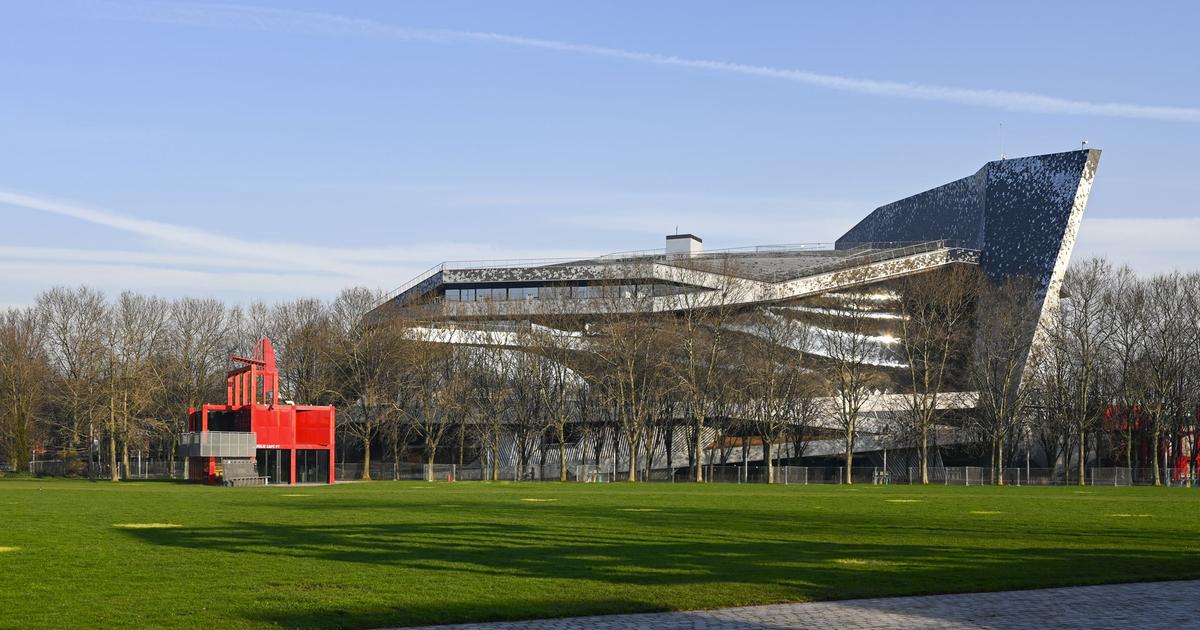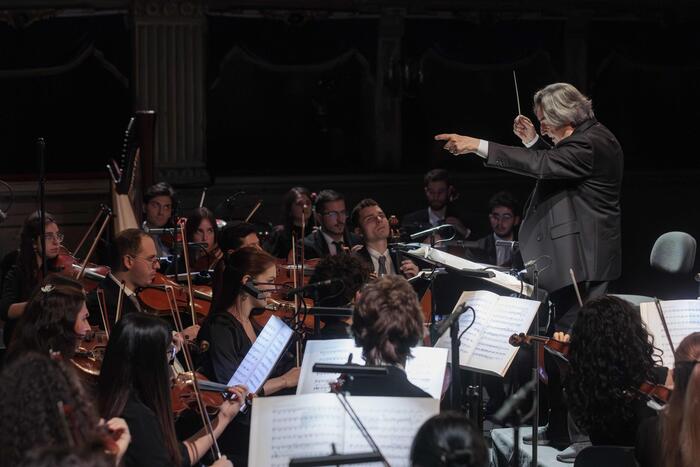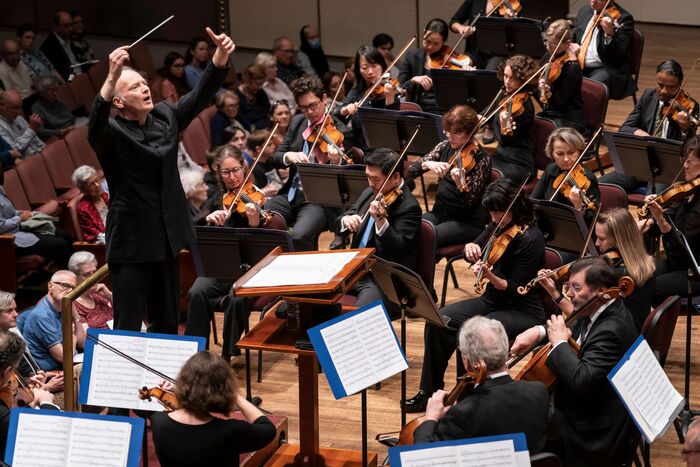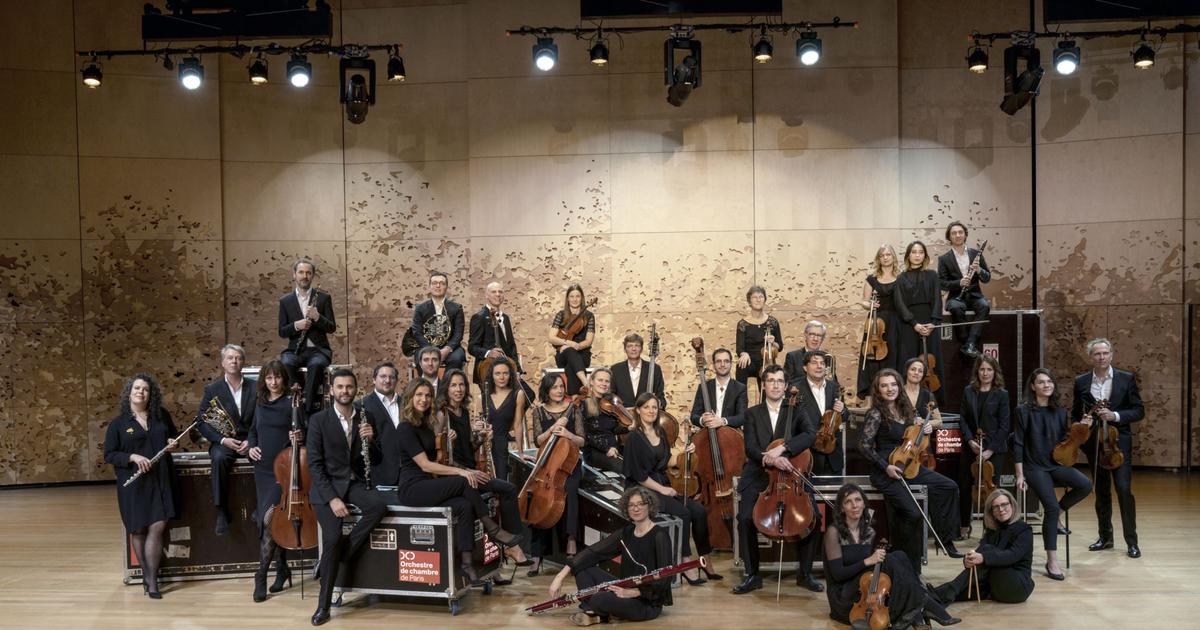They left kyiv late in the Russian invasion.
They met in Warsaw, where they gave their first concert outside Ukraine, they continued in Germany and this week they stop in Madrid to perform at the NATO summit.
It has been an unforeseen gift for the leaders from the Spanish Government.
The music of the kyiv Symphony Orchestra will sound this Wednesday in the middle of the meeting of leaders inside the Prado Museum and serves these months as a symbol and wake-up call for Europe.
As two of its members affirm more than conscientiously, as is the case of Olha Stukalova, flute, and Oleksii Pshenychnikov, violin: "We are a cultural front in the midst of war."
More information
Concert on the barricades of the Odessa Opera House
The last week of February, the musicians were rehearsing the pieces for a concert planned for the beginning of March in kyiv together with the German baritone Matthias Goerne.
But on February 24 everything was put on hold: their program, their lives, the music… So much so that for weeks Oleksii and Olha, who was not part of the group at the time, were unable to articulate any notes on their instruments.
Even so, they carried them with them, convinced that at any moment they would need them.
“My mother, who has been collaborating with an NGO since 2014, told my sister and me before the invasion began: 'Pack up everything because something might happen,'” recalls Olga from her retreat in Gera, Germany, near Leipzig. .
From left to right, Oleksii Pshenychnikov, second violin;
Luigi Gaggero, conductor, and Olha Stukalova, flute.
Jaime Villanueva
She was skeptical.
She believed that in the end, everything would work out: “What an idiot I was.
Today I regret having felt so innocent,” says the 22-year-old flutist.
What she never imagined happened: “Planes passed by our windows, very soon we felt the bombing of neighboring neighborhoods, we began to call family and friends.
I couldn't eat, I couldn't even think about playing my flute, I was paralyzed for weeks.
What has stuck with both of them is the sound.
A strange vibration to life, violent, stubborn and absent of harmony.
“Since I'm a musician, that's what struck me the most, that sound of planes, bombs, sirens, tanks, helicopters…” says Olekssi, 23: “If I hear a blow, a car will run over me. a tunnel or a siren anywhere startles me.
I know that feeling will stay with me for many years to come”, says the violinist.
For days he couldn't eat or sleep a wink.
His obsession boiled down to seeking shelter in case danger approached: “My brother and I were home alone for the first two days until my mother was able to come back for us.
She works in the nuclear safety department and she couldn't possibly leave her position.
When she arrived, we went to my aunt and uncle's house, in the country.
Everything was collapsed.
If you stayed on the road, you didn't advance, we did kilometers off-road”.
One of the musicians of the kyiv Orchestra, with a Ukrainian flag on his cello. Jaime Villanueva
The first days were terrifying for them: from home to the nearest shelter.
Suddenly, that already truncated life in which camaraderie reigned and the festive atmosphere in the orchestra was broken.
The violinist had barely been inside a year;
Olha was part of other student groups and was directing the rehearsals of the wind sections among his own when everything fell apart.
Later she traveled to Germany and joined the orchestra with Oleksii.
Luiggi Gaggero, Italian and chief conductor of the kyiv Symphony, was out of the country.
He spent a few days in Strasbourg, where he teaches at the conservatory.
He immediately activated his contacts.
He did what he could, wrote articles in the press and moved among colleagues to get the musicians out of the city and gather them somewhere.
Warsaw was the meeting place.
They gave a choice between staying or leaving.
More than 80 musicians and part of their families chose to move to Poland with an uncertain future: “Today we are a nomadic orchestra.
We go to those cities that welcome us.
We started in Warsaw, where we were able to rehearse and give concerts, we continued in Germany.
Perhaps in Spain they can welcome us for a while”, he affirms.
cultural genocide
Ukraine lives under martial law.
Men between the ages of 18 and 60 cannot leave the country without permission from the government.
"At first, the Ministry of Culture and the Ministry of Defense granted the musicians a month, but later, when they verified the impact that the concerts had, they have definitively extended them."
And it is that today, the kyiv Symphony Orchestra has become a symbol outside its borders with the express support of the Government of Volodímir Zelenski.
“We are the cultural front”, assure the two young musicians.
"We have a responsibility as ambassadors of Ukraine, we must convey a message to the world: they not only want to kill us, we also suffer a cultural genocide," says Oleksii Pshenychnikov.
For this, in their concerts they perform mainly Ukrainian composers.
In Madrid, the
Symphony in C major
by Maksim Berezovski will be played, something that will also be discussed in a meeting with students from the Reina Sofía School in the morning.
The piece was created between 1770 and 1772 and is considered the first composed in Ukraine, according to Luigi Gaggero.
“A proof also of the European roots that the country's music has.
Berezovski studied in Italy with Father Martini, one of Mozart's teachers."
Rehearsal of the kyiv Symphony Orchestra, conducted by Luigi Gaggero, at the Prado Museum in Madrid.
Jaime Villanueva
Gaggero, a 46-year-old from Genoa, entered the orchestra as principal conductor in 2014. "That they chose me shows their talent," he says.
"Not many foreign directors work there or in the countries in that area."
The exchange in this sense has been very rich for him: “I have tried to provide them with another repertoire, another sound, other aesthetic visions;
we are mutually enriching ourselves with shared experiences and baggage;
After all, that's the end of music, isn't it?
To the artistic adventure, another one joins today: diplomatic and political, on the one hand;
combative, on the other… They have plenty of motivation.
The last few months have also transformed them as musicians.
“When we met in Warsaw at the beginning of April, we had not worked together for a month and a half.
He hadn't listened to them again.
They impressed me…”, says the headline.
Inactive weeks had not stunted them.
The psychological blow, the tragic odyssey of being forced to leave the country with no return date, far from paralyzing them, has motivated them extraordinarily.
“Already in the first rehearsal I was struck by his level of intensity.
It was something I had never felt in my life.
For them it had gone from being a mere job to something that they faced as a new sense of life, another spirit sprouted from the instruments, an unknown oxygen.
It was a great lesson."
Gaggero believes that art is connected to a special bond that strengthens it with the need to survive, with crises, with states of emergency.
"That's when it shows that it's not just entertainment, but that it establishes a connection with very deep feelings and the conviction that it is useful and essential in tragic situations."





/cloudfront-eu-central-1.images.arcpublishing.com/prisa/XWGQ7OKMRBDIZHWIQPOHFW54FM.jpg)









